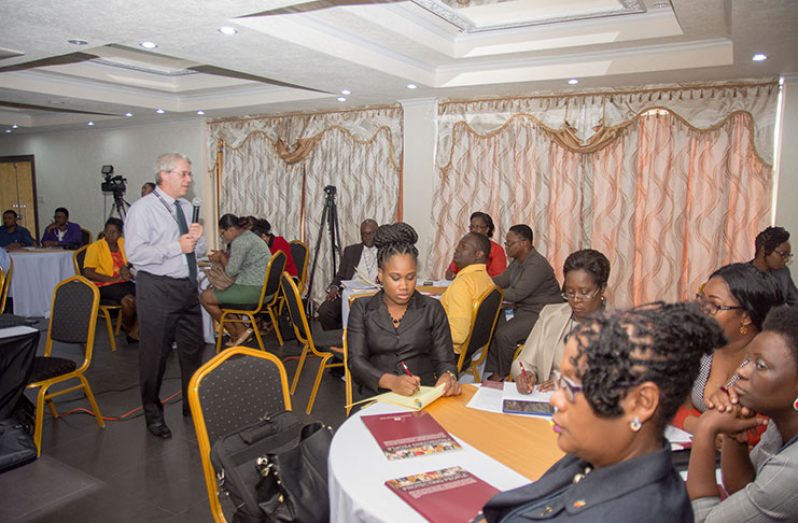–deems it ‘a very delicate yet critical issue’
THE International Labour Organisation (ILO) is seeking to address the delicate but very critical issue of informal employment and its impact on the economy.
It plans doing so through a two-day workshop convened here Tuesday at the Tower Hotel.
The confab specifically targeted labour officers and other stakeholders from Guyana and five other Caribbean countries, namely: Jamaica, St Lucia, Belize, Dominica, and Suriname.
It was hoped that at the end of the meet, participants would have been well informed about the relationship between labour administration and the informal economy, and the ILO’s mandate in safeguarding workers in informal employment.
Back in 2013, the ILO regional office for the Caribbean and Latin American had launched a programme for the promotion of formalisation in Latin America and the Caribbean.
The programme has three components, namely: Generation and dissemination of knowledge of formalisation policies; technical assistance to specific countries; and capacity-building of workers and employers organisations in formalisation issues.
According to the ILO, informal employment has been a problem within Latin America and the Caribbean, in that workers do not enjoy the benefits of the decent-work programmes and are exposed to poor working conditions, among them little to no social coverage. They are also deprived of social protection and labour rights.
The organisation is hoping that the dissemination of information will help promote broader discussions on the strategies countries may use to facilitate the transition to formality in the Region.
ILO representative Ryner Plitzer said that the issue is a very delicate yet critical one, and that what the workshop proposes to do is examine how government and the labour administration system can better reach out to the large number of workers in the informal economy.
He said the carefully selected group of participants is a very “homogeneous group”, since each person has the same objective of protecting, guiding and assisting the workforce.
“How can we guide them towards a safer, productive and sustainable and less emergency-ridden worklife? How to bring them closer to decent work,” he said, was just one of the questions they proposed dealing with over the two-day meet.
“Most countries around the world,” he said, “have no good answer to this question, and we all struggle when trying to address the informal economy.”
According to him, in Latin America alone, some 90 per cent of new jobs are created in the informal economy. And while the informal economy may not be much of a problem in the Caribbean, questions arise when the decent-work deficit is examined in the various sectors.
According to Plitzer, all the positives, by and large, only address the formal sector.
“With pensions, inspections, credit and loans and audit reports, we always look at the formal economy, which, in essence, see us looking at just about 50 per cent of the national workforce,” he said, adding:
“Are we doing ourselves a disservice? Is this the best way to keep labour administration relevant? I think it is worthwhile to ask ourselves these questions.”
He said the ILO has studied this, and received support from the international community.
Delivering remarks on behalf of the Ministry of Social Protection was Permanent Secretary, Ms Loreen Baird, who said persons within the informal sector do not have access to social security schemes, health and safety programmes and maternity benefits and have little or no protection by labour legislation.
According to her, all the above issues fall within the ambit of the Social Protection Ministry. The informal economy, she went on to say, plays a significant role in employment-provision and generation.
She is of the opinion, however, that persons need to understand that inclusive development is not possible unless the rights and opportunities embedded in Guyana’s Constitution are extended to workers in the informal economy.
She said the authority must ensure that all workers are protected, whether or not they are part of the informal or formal economy.



.jpg)








